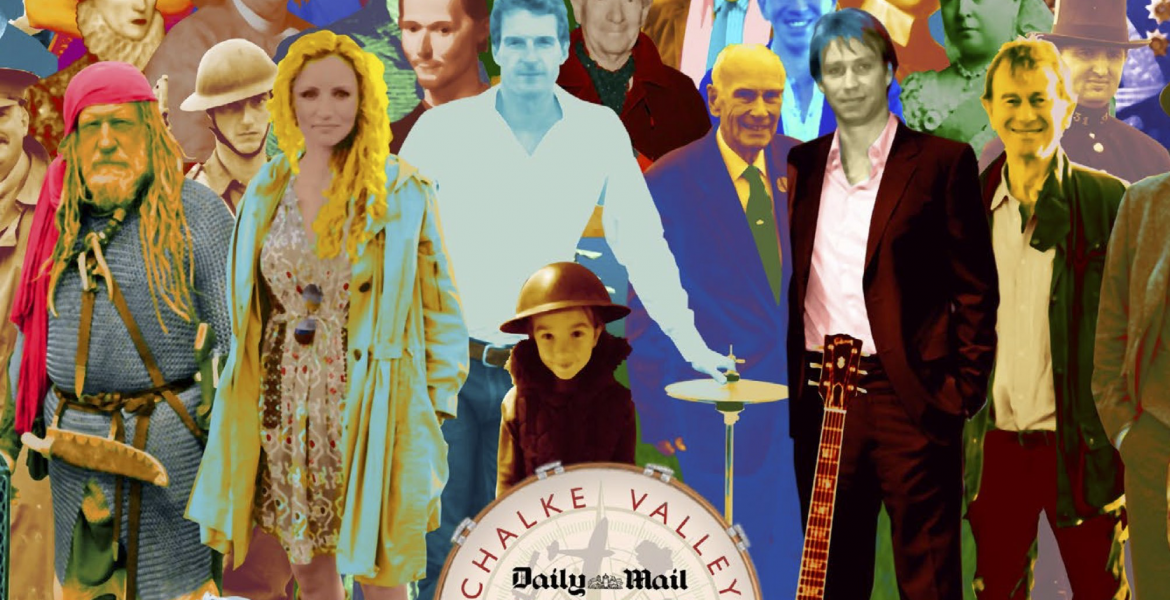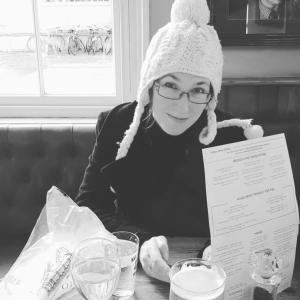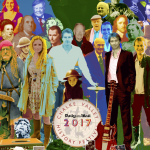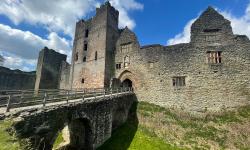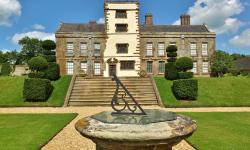Falling in love with the Chalke Valley History Festival
We like to do things on the weekend. It gets the kids away from the TV and iPads, and provides us with an excuse for forgetting the housework. So for months – since the programme for the 2017 Chalke Valley History Festival was released in March – we’d ummed and ahhed over whether it was worthwhile going. Two hours’ driving seemed a lot when we wouldn’t actually be able to attend any talks. But then a few days beforehand we looked at the optimistic weather forecast and realised the festival was in effect providing a babysitting service (for six to twelve year olds) and thought ‘why not?’ A day trip quickly turned into an over-nighter when we spotted Tom Holland giving a child-friendly talk on King Arthur, and our weekend plans were complete.
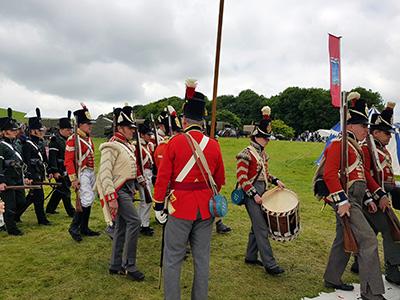
Chalke Valley History Festival is designed to inspire, excite, and inform. Established in 2011 as a fundraiser for the local cricket club, the festival has rapidly grown in size to become the largest festival dedicated to history in the UK. With a comprehensive programme of speakers lined up for the whole week, it also has living history, ‘pop-up’ free talks, air displays, and family activities, including sword school and interactive First World War trench experiences. Situated in the Chalke Valley in Wiltshire, the site stretches over several acres, providing space for scores of tents for everything from talks given to over 500 people to individual re-enactment pitches. Shops, a bar, and food stalls make it very easy to spend money: authors after delivering their speech will wander over to the Waterstones tent where they sign copies of their books, and the wide-range of food on offer covers everything from sit-down dining to fish and chips and super-hot Caribbean curries.
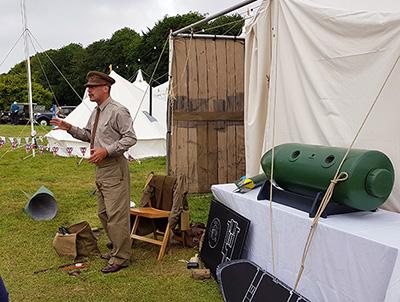
Sadly, as we didn’t feel comfortable – or able – to take the children out of school for more than an afternoon, we missed a fantastic line-up of speakers during the first part of the week. These included David Horspool on Oliver Cromwell, Andrew Marr on the history of modern Britain, Paul Cartledge on Herodotus, Suzannah Lipscomb on Shakespeare, James Daybell and Sam Willis on histories of the unexpected, Paddy Ashdown on spies during the Second World WarA global war that lasted from 1939 until 1945., Harriet Harman on women in politics, and Diarmaid MacCulloch on the ReformationThe split from the Roman Catholic Church of protestants, inspired by people such as Martin Luther, John Calvin, and Huldrych Zwingli.The split from the Roman Catholic Church of protestants, inspired by people such as Martin Luther, John Calvin, and Huldrych Zwingli.. These represent just 7% of the talks on offer during the week.
These represent just 7% of the talks on offer during the week.
But we did manage to attend three talks over the weekend: Tom Holland’s introduction to the legends of King Arthur that he managed to keep clean; Nicholas Crane providing a whistle-stop tour of the landscape of Britain from the last ice ageA time when it was very cold and glaciers extended down from the North Pole. See 'A Brief History of Climate Change'. to the present; Condensing approximately 17,000 years into 60 minutes, which worked out at about 280 years per minute. and James Holland interviewing Katrin Himmler, great-niece of Heinrich. Each one, although loosely connected to history, was fascinating in its own right, providing insight on subjects to which we perhaps hadn’t previously given much thought. For events that wouldn't interest the kids, we booked them into the children’s activity tent. Spaces were limited, but the staff and volunteers were properly trained and fully-checked, and the children had a whale of a time, listening to stories, making treasure boxes and fans, and playing with others their own age.
Condensing approximately 17,000 years into 60 minutes, which worked out at about 280 years per minute. and James Holland interviewing Katrin Himmler, great-niece of Heinrich. Each one, although loosely connected to history, was fascinating in its own right, providing insight on subjects to which we perhaps hadn’t previously given much thought. For events that wouldn't interest the kids, we booked them into the children’s activity tent. Spaces were limited, but the staff and volunteers were properly trained and fully-checked, and the children had a whale of a time, listening to stories, making treasure boxes and fans, and playing with others their own age. Unfortunately, some of the activities, such as ‘espionage’ and sword-making were already fully booked. Next year we will have to be a bit more decisive!Emerging from the tents, we found re-enactors teaching us how to dispose of Second World War bombs, battles from the Napoleonic WarsThe Napoleonic Wars lasted from 1803 until 1815 (although some people also include the French Revolutionary Wars in this, which started in 1792 and continued until 1802. The Napoleonic Wars were therefore a continuation of the Revolutionary Wars). A number of European powers fought against the expansionist French Empire.The Napoleonic Wars lasted from 1803 until 1815 (although some people also include the French Revolutionary Wars in this, which started in 1792 and continued until 1802. The Napoleonic Wars were therefore a continuation of the Revolutionary Wars). A number of European powers fought against the…, the History Tellers entertaining us with weird and wonderful tales, Viking parades, and Charlie Higson doing impromptu stand-up. It was a feast for eyes and ears as much as it was for the brain.
Unfortunately, some of the activities, such as ‘espionage’ and sword-making were already fully booked. Next year we will have to be a bit more decisive!Emerging from the tents, we found re-enactors teaching us how to dispose of Second World War bombs, battles from the Napoleonic WarsThe Napoleonic Wars lasted from 1803 until 1815 (although some people also include the French Revolutionary Wars in this, which started in 1792 and continued until 1802. The Napoleonic Wars were therefore a continuation of the Revolutionary Wars). A number of European powers fought against the expansionist French Empire.The Napoleonic Wars lasted from 1803 until 1815 (although some people also include the French Revolutionary Wars in this, which started in 1792 and continued until 1802. The Napoleonic Wars were therefore a continuation of the Revolutionary Wars). A number of European powers fought against the…, the History Tellers entertaining us with weird and wonderful tales, Viking parades, and Charlie Higson doing impromptu stand-up. It was a feast for eyes and ears as much as it was for the brain.
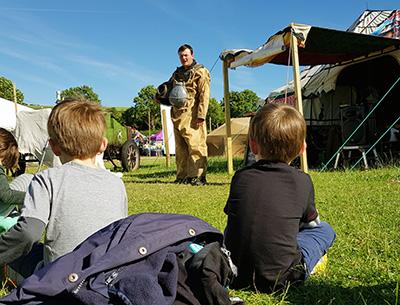
What’s more, tickets and entry didn’t cost the earth. Family entry to the festival alone was £33 per day, although it was free to those booked into events, which cost anywhere between £8 and £13.75 per person. Plus the money raised goes to a good cause, with all proceeds from the festival going towards promoting history, particularly to children. Admittedly, the talks weren’t of the cosy, intimate nature that one finds with smaller literary festivals, book-seller events, or the likes of the History Masterclass, but the sound worked and there was still the chance to ask questions at the end.
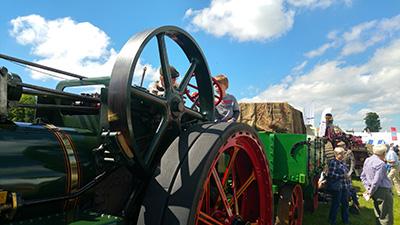
A festival – particularly one set in a field – tends to bring up images from my youth: loud, obnoxious, uncomfortable, and dirty. The Chalke Valley History Festival is nothing like this. The site is spotless and meticulously cared for; parking is easy; and the toilets have minimal queues, are clean, and well-maintained. Although many of the talks are aimed at an adult audience, there is definitely a family feel to the festival – it seems safe and welcoming. Unlike other field-based festivals, there is not camping onsite, although there is a campsite within walking distance (which is a little on the pricey side). For those who don’t like camping, or would rather have a private bathroom and comfortable bed for the same price, Salisbury is just down the road with a range of hotels.
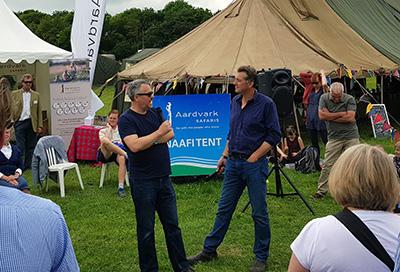
It’s difficult to find fault with Chalke Valley History Festival. Perhaps, as with someone newly in love, I’m looking at it through rose-tinted spectacles. Getting to the site is a bit of a pain, both in terms of its immediate vicinity and its distance from where I live. Accommodation is necessary, which increases the cost of the event, and the food and drink is expensive – a small fish and chips was £7, and a pint of beer over £5. But overall, the value for money is excellent, the things to see and do almost endless (and certainly too much to fit into a day and a half), and the fun factor for the whole family is high. My only problem now is working out how I can get the children out of school for longer next year!
To find out about next year's event, visit the Chalke Valley History Festival website at https://cvhf.org.uk/
- Log in to post comments


